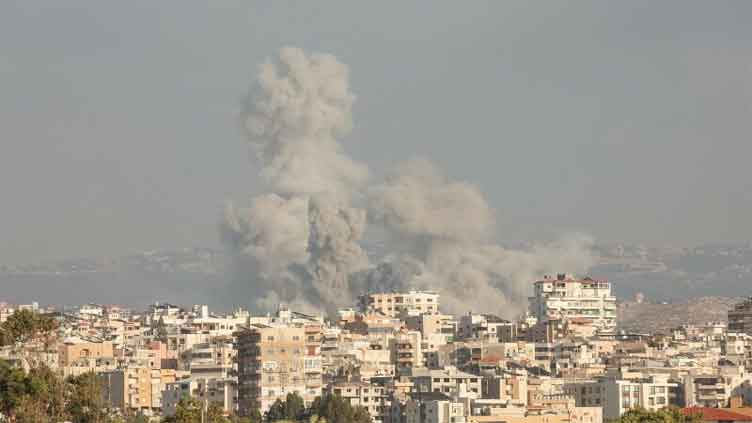274 dead, over 1,000 wounded in Israeli strikes on Hezbollah strongholds in Lebanon

World
274 dead, over 1,000 wounded in Israeli strikes on Hezbollah strongholds in Lebanon
(AFP) - Lebanese Health Minister Firass Abiad said the death toll in Israeli strikes Monday rose to 274, including 21 children, the bloodiest daily toll in nearly a year of cross-border clashes.
The toll stood at “274 dead, including 21 children and 39 women — that’s who we know about until now”, Abiad told reporters, adding “thousands of families from the targeted areas have been displaced”.
The dead also included two rescuers, with 16 other emergency workers wounded, he said, adding that “two ambulances, a fire truck and a medical centre were targeted”.
The attacks wounded 1,024 people who were treated in 27 hospitals, Abiad said.
About 5,000 people had been wounded “in less than a week” of Israeli attacks, he said, after Hezbollah pagers and walkie-talkies exploded and an Israeli strike on Beirut’s southern suburbs.
That number accounts for about half of the overall wounded toll of “10,000 to 11,000”, he said, referring to nearly one year of cross-border clashes between the Iran-backed Hezbollah group and Israel after the eruption of the Gaza conflict.
The conflict began when Hamas attacked Israel, with Hezbollah and other Iran-backed groups around the region drawn into the violence.
The Israeli military said it had struck around 800 Hezbollah targets on Monday.
“Since this morning, the IDF [military] has conducted proactive and extensive aerial strikes against Hezbollah terrorist targets in Lebanon,” a statement said, adding that the strikes hit “approximately 800 Hezbollah terror targets in southern Lebanon and in the area of Bekaa deep inside Lebanese territory”.
World powers have implored Israel and Hezbollah to pull back from the brink of all-out war, with the focus of violence shifting sharply in recent days from Israel’s southern front with Gaza to its northern border with Lebanon.
“We sleep and wake up to bombardment … that’s what our life has become,” said Wafaa Ismail, 60, a housewife from the southern Lebanese village of Zawtar.
More to come
Israeli military spokesman Rear Admiral Daniel Hagari told people in Lebanon to avoid potential targets linked to Hezbollah as strikes would “go on for the near future”.
Hagari said Israel’s military “will engage in [more] extensive and precise strikes against terror targets which have been embedded widely throughout Lebanon”.
He told civilians to “immediately move out of harm’s way for their own safety”.
The strikes sent hundreds of people fleeing their homes, according to Bilal Kachmar, an official in Tyre.
“Hundreds of displaced people rushed” to a school-turned-shelter in the southern city, he said, with many others “camping out in the streets”.
AFP correspondents saw rows of cars leaving the nearby city of Sidon.
The Israeli military also warned people living in the Bekaa valley, in eastern Lebanon, to flee their homes, as it announced it was “broadening” the scope of its strikes.
Explosions around the ancient city of Baalbek in eastern Lebanon triggered flashes of fire and sent smoke billowing into the sky.
In divided Lebanon, large parts of the south and east of the country, as well as the southern suburbs of capital city Beirut, are seen as strongholds of Hezbollah, where the group has historically wielded influence and built up services for its support base.
The education minister said schools in targeted areas would close for two days.
The official National News Agency said the Lebanese had received phone messages from Israel telling them to “quickly evacuate”.
Hezbollah, a powerful political and military force in Lebanon, says it is acting in its near-daily battle with Israeli troops along Lebanon’s border in support of its Palestinian ally Hamas, which is also backed by Iran.
Israel changing ‘security balance’
Prime Minister Benjamin Netanyahu said on Monday that Israel was not waiting for threats to emerge but was preempting them and was acting to change the “security balance” in the north.
Hezbollah’s deputy chief, Naim Qassem, said the group was in a “new phase, namely an open reckoning” with Israel, and ready for “all military possibilities”.
They spoke after Hezbollah rocket attacks on northern Israel caused damage in the area of Haifa, a major city on Israel’s north coast.
On Sunday morning, hundreds of thousands of people in northern Israel fled to their bomb shelters as Hezbollah fired a barrage of rockets across the border.
The attack came after an Israeli air strike in Hezbollah’s southern Beirut stronghold on Friday killed its elite Radwan Force commander, Ibrahim Aqil, along with other commanders and civilians.
Last Tuesday and Wednesday, coordinated communications device blasts that Hezbollah blamed on Israel killed 39 people and wounded almost 3,000.
On Sunday, Hezbollah said it targeted Israeli military production facilities and an air base in the Haifa area with rockets as “an initial response”.
On Monday, the group said it had again fired rockets at military sites near Haifa.
“No country can live like this,” said Ofer Levy, 56, a customs officer, who lives on the edge of Haifa.
Since the cross-border exchanges between Israel and Hezbollah began in October, tens of thousands of people on both sides have fled their homes.
An Israeli military official, who cannot be further identified under military rules, on Monday outlined the goals of the military operation.


